English Words in Action, Group C
(a variety of English words which have developed through history and are currently used in our modern age)
Simply click on this banner (or the following link) and you will be on your way to stimulate your brain for greater word comprehension with quizzes based on some of the words in this unit.
2. To estimate the value of something or the timing of an event: Jamal calculates that he will be in Frankfurt in six more hours of flight time.
3. To intend or to encourage something to happen: The President's speech was calculated to ease national tensions.
4. Etymology: traced back to Latin calculus, "pebble", referring to the early use of pebbles in counting.
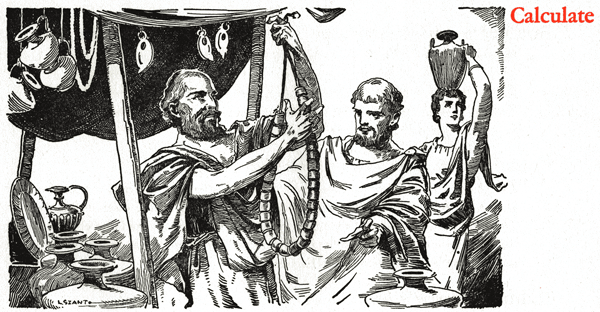
The Romans had no adding machines. Even the art of writing was known to comparatively few people. So they did their adding and subtracting with the aid of little stones used as counters.
The Latin word for the little rock used in this way was calculus, a diminutive of calx, meaning "limestone".
From calculus, the verb calculare, "to calculate", was formed, and its past participle, calculatus, is the immediate origin of English "calculate".
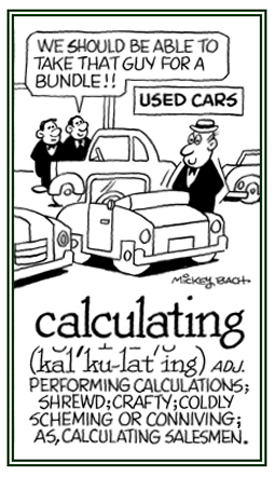
Go to this Word A Day Revisited Index
so you can see more of Mickey Bach's cartoons.
2. To accuse falsely or to misrepresent in order to defame or to slander another person with the intent of damaging his or her reputation: The reporter wrote an article in the local newspaper which tried to calumniate, or vilify, the owner of a popular restaurant for personal reasons.

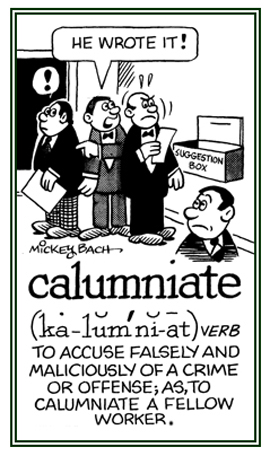
Go to this Word A Day Revisited Index
so you can see more of Mickey Bach's cartoons.
2. An untrue statement that is made to damage someone's reputation or standing: The President of the U.S. is accused of uttering calumnies against the TV media for reporting what they believe to be misbehavior on his part.
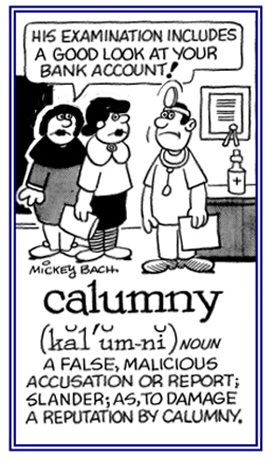
Go to this Word A Day Revisited Index
so you can see more of Mickey Bach's cartoons.
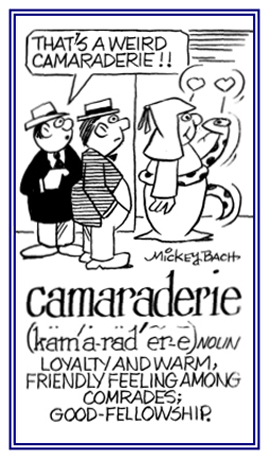
Go to this Word A Day Revisited Index
so you can see more of Mickey Bach's cartoons.
2. An exclusive and unofficial group of individuals, usually secret advisors who interact with one another and share similar interests: In the story Fred was reading, the camarilla, or inner circle of selected people, met once a month and planned their next scheme to overthrow the presiding king.
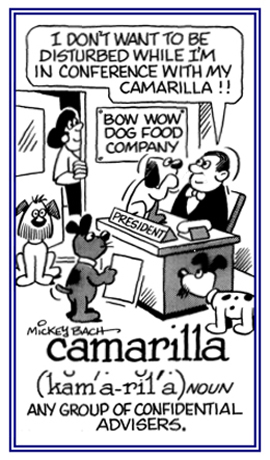
Go to this Word A Day Revisited Index
so you can see more of Mickey Bach's cartoons.
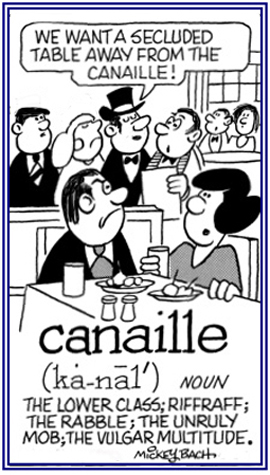
Go to this Word A Day Revisited Index
so you can see more of Mickey Bach's cartoons.
Margaret's canny financial investments produced significant profits for her venture capitalists.
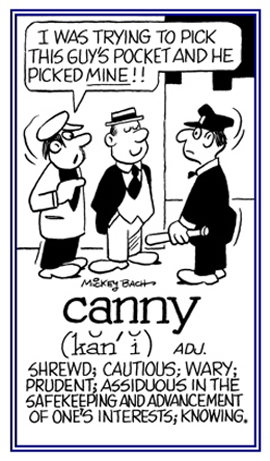
Go to this Word A Day Revisited Index
so you can see more of Mickey Bach's cartoons.
2. Etymology: the origin is not unanimously agreed to by all sources; possibly it is from Middle English contekour, "brawler" from contek, "strife" or perhaps from Irish cannran, "strife, grumbling".
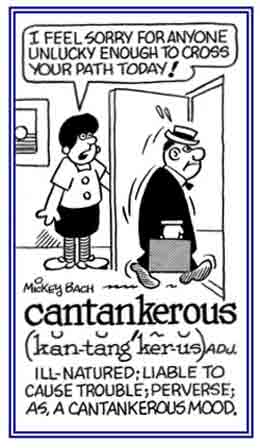
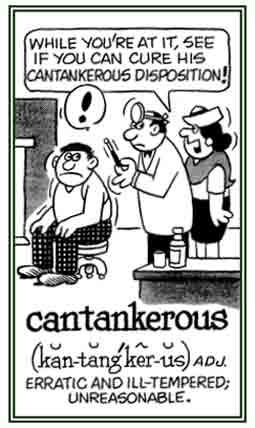
Go to this Word A Day Revisited Index
so you can see more of Mickey Bach's cartoons.
Websites often ask people to decipher a few wiggly letters because they are trying to find out if a user is a human or spamware.
The electronic hoop people are required to jump through was invented in 2000 by a team of programmers at Carnegie Mellon University because someone at Yahoo! went to them hoping that they could come up with a program to stop criminals from using software to automatically create thousands of e-mail accounts and then using those accounts to send out spam.
The Carnegie Mellon team developed CAPTCHA which stands for "completely automated public turing test to tell computers and humans apart". The purpose of the CAPTCHA is that reading those swirly letters is something that computers aren't very good at doing.
By the way, the term "turing" refers to a hypothetical computer with an infinitely long memory tape which can modify its original instructions by reading, erasing, or writing a new symbol on a moving tape of fixed length that acts as its program.
The CAPTCHA has become widespread all over the web. According to Luis von Ahn, an assistant professor at Carnegie Mellon, who was part of the original CAPTCHA team, estimates that people fill out close to 200 million CAPTCHAs every day.
Von Ahn is confident that the good guys are still ahead for now, but the point at which cyber-criminal software can reliably read CAPTCHAs is probably as few as three to five years away.
The real innovation among cyber-criminals will come through social networking and Web-based services. During the year 2008, spammers increased with the targeting of web-based e-mail from large, free, reputable providers, using new techniques to break CAPTCHAs and to generate massive numbers of personal accounts. Mail from these domains was the least likely to be blocked by IT departments.
The real innovation among cybercriminals will come through social networking and Web-based services. This past year spammers expanded to targeting web-based email from large, free, reputable providers, using new techniques to break CAPTCHAs and generate massive numbers of personal accounts. Mail from these domains was the least likely to be blocked by IT departments.
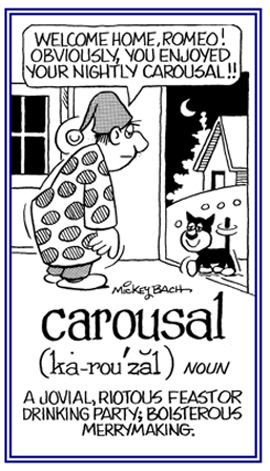
Go to this Word A Day Revisited Index
so you can see more of Mickey Bach's cartoons.
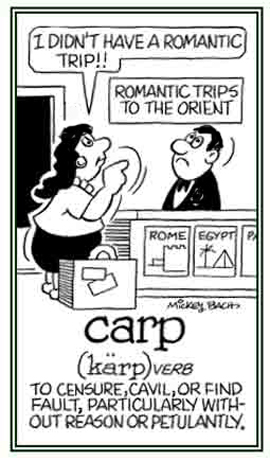
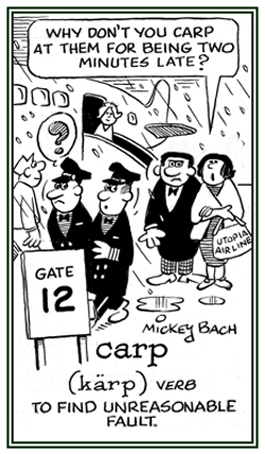
Go to this Word A Day Revisited Index
so you can see more of Mickey Bach's cartoons.
2. Etymology: from French which came from Italian cascata, from cascare, "to fall", from Vulgar Latin casicare based on Latin cadere, "to fall".
When a person is cashiered, he or she is laid off, fired, or discharged from a job or profession in disgrace or for doing something unacceptable at his place of employment.
The verb cashier has nothing to do with the noun "cashier"; however, it doesn't mean that a "cashier" can't be cashiered.
2. Etymology: from Latin cassare, "to annul"; from cassus, "void, empty".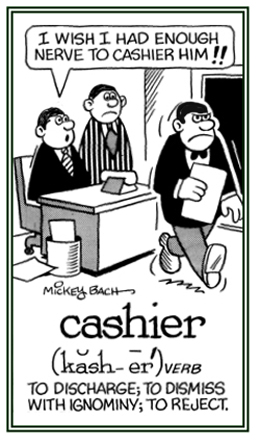
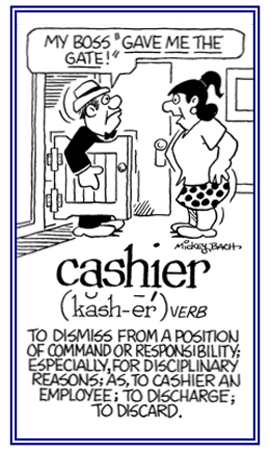
Go to this Word A Day Revisited Index
so you can see more of Mickey Bach's cartoons.
Links to all of the groups of English words in action, Groups A to Z.
You may see the bibliographic list of sources of information for these words in action.


